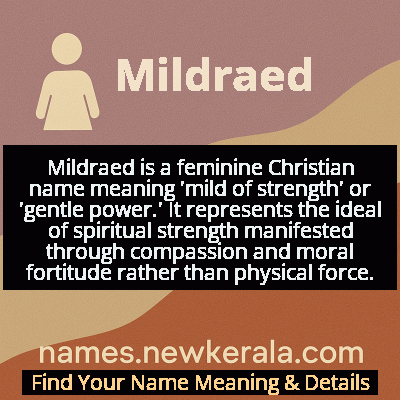Mildraed Name Meaning & Details
Origin, Popularity, Numerology Analysis & Name Meaning of Mildraed
Discover the origin, meaning, and cultural significance of the name MILDRAED. Delve into its historical roots and explore the lasting impact it has had on communities and traditions.
Name
Mildraed
Gender
Female
Origin
Christian
Lucky Number
3
Meaning of the Name - Mildraed
Mildraed is a feminine Christian name meaning 'mild of strength' or 'gentle power.' It represents the ideal of spiritual strength manifested through compassion and moral fortitude rather than physical force.
Mildraed - Complete Numerology Analysis
Your Numerology Number
Based on Pythagorean Numerology System
Ruling Planet
Jupiter
Positive Nature
Optimistic, inspirational, and creative.
Negative Traits
Scattered, exaggerating.
Lucky Colours
Yellow, gold, purple.
Lucky Days
Thursday.
Lucky Stones
Yellow sapphire.
Harmony Numbers
1, 2, 9.
Best Suited Professions
Arts, writing, communication.
What People Like About You
Creativity, optimism.
Famous People Named Mildraed
Mildraed of Thanet
Anglo-Saxon Abbess
Founded a monastery in Kent and was venerated as a saint for her charitable works
Mildraed of Mercia
Christian Missionary
Established Christian communities throughout Mercia and translated religious texts
Mildraed Fletcher
Religious Scholar
Authored influential works on early English Christian women's spirituality
Name Variations & International Equivalents
Click on blue names to explore their detailed meanings. Gray names with will be available soon.
Cultural & Historical Significance
The name's enduring appeal lies in its embodiment of an ideal Christian femininity that was both spiritually powerful and socially influential. In medieval hagiographies, Mildraed was depicted as performing miracles of healing and protection, demonstrating that spiritual power could be more effective than military might. This made the name particularly popular among noble families who wanted to emphasize both their Christian devotion and their social status. The cultural legacy of Mildraed persists in place names, church dedications, and historical records throughout England, serving as a tangible connection to the early Christianization of the British Isles and the important role women played in this transformative period.
Extended Personality Analysis
Women named Mildraed typically exhibit a remarkable balance of strength and gentleness that defines their character. They possess an inner resilience that allows them to withstand adversity without becoming hardened or bitter. This strength is not the aggressive, domineering type but rather a quiet, steadfast determination rooted in deep convictions and moral principles. Mildraeds are often perceived as calm centers in turbulent situations, their presence bringing a sense of stability and peace to those around them. They have a natural ability to listen deeply and understand multiple perspectives, making them exceptional mediators and counselors.
Their gentle exterior belies a core of iron will when it comes to protecting what they value - whether people, principles, or communities. Mildraeds are typically highly empathetic individuals who feel others' pain deeply and are driven to alleviate suffering wherever they encounter it. They lead through example rather than command, inspiring loyalty and respect through their consistent character and compassionate actions. While they may avoid confrontation, they are not passive; when necessary, they can take firm stands with surprising conviction. Their strength is most evident in their capacity for forgiveness, patience, and enduring love - qualities that require far more courage and fortitude than aggression or domination. This unique combination makes Mildraeds natural nurturers who strengthen others while maintaining their own integrity.
Modern Usage & Popularity
In contemporary naming practices, Mildraed remains an exceptionally rare choice, primarily preserved within specific communities that value Anglo-Saxon heritage and early Christian history. The name sees occasional use among families with historical connections to English Catholicism or those involved in traditional Christian communities that honor early English saints. While its more common variant 'Mildred' experienced popularity in the early 20th century before declining, Mildraed has never achieved widespread usage, making it a distinctive choice for parents seeking unique historical names. Recent years have seen a slight increase in interest as part of the broader trend toward vintage and saintly names, particularly among parents looking for names with deep spiritual meaning and historical significance. The name is most likely to be encountered in historical reenactment communities, among scholars of early English history, or in families with specific devotion to early English saints. Its rarity ensures that any modern Mildraed will have a name that is both meaningful and distinctive.
Symbolic & Spiritual Meanings
Symbolically, Mildraed represents the profound spiritual truth that genuine strength manifests through gentleness, compassion, and moral integrity rather than through force or domination. The name embodies the Christian paradox that true power is found in service and that leadership through love surpasses rule through fear. It symbolizes the concept of spiritual warfare - not against earthly enemies but against sin and suffering, fought with weapons of faith, hope, and charity. Mildraed serves as a living metaphor for the idea that the mightiest forces in nature and spirit are often the gentlest: the steady flow of water that shapes stone, the patient growth of roots that break rock, the quiet persistence of love that transforms hearts. The name calls to mind the image of the shepherd rather than the warrior - one who protects and guides through attentive care rather than violent conquest. In Christian symbolism, it resonates with Christ's description of himself as 'gentle and humble in heart' while possessing ultimate authority, representing the perfect integration of divine power and human compassion.

